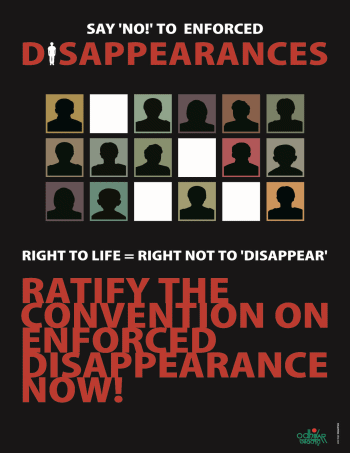A Joint Statement by the Asian Federation Against Involuntary Disappearances, International Federation for Human Rights, Maayer Daak, Odhikar and the World Organisation Against Torture on the occasion of International Day in Support of Victims of Torture 2022
Manila/Dhaka/Geneva/Paris, 25 June 2022: The government of Bangladesh must end torture as well as other rampant human rights violations and stop persecuting human rights defenders and families who speak against abuses, the Asian Federation Against Involuntary Disappearances (AFAD), the International Federation for Human Rights (FIDH), Maayer Daak, Odhikar, and the World Organisation Against Torture (OMCT) said today on the occasion of the International Day in Support of Victims of Torture (26 June).
In Bangladesh, human rights abuses by law enforcement agencies and security forces, including acts of torture, enforced disappearances, extrajudicial killings, and other forms of degrading and ill-treatment remain widespread and systematic. Members of these forces have almost never been held accountable for these violations, but rather enjoyed impunity as an implicit acknowledgement by the government of their role in the suppression of political opponents, government critics and dissidents.The elite force Rapid Action Battalion (RAB) is particularly notorious for widespread abuses.
Torture, both physical and mental, has become an institutionalised practice in the country. It is used to obtain confessions, which despite their unreliability, often constitute the main or only proof used to convict defendants. Torture often precedes other forms of human rights violations, such as arbitrary detentions and enforced disappearances, which occur with alarming frequency against political opponents and dissenting voices in Bangladesh. Victims of torture and other forms of degrading and ill-treatment have been subjected to harassment and intimidation after filing cases against the alleged perpetrators and have also been forced or threatened to withdraw their cases.There have also been allegations against the police that they often exercise influence over medical examination reports to suppress the evidence of torture.
According to Odhikar, at least 90 persons were tortured to death in Bangladesh between November 2013 and May 2022, despite the enactment of the Torture and Custodial Death (Prohibition) Act, 2013 on 24 October 2013, which criminalises all acts of torture, and despite Bangladesh’s ratification of the UN Convention against Torture and Other Cruel, Inhuman or Degrading Treatment or Punishment (CAT) in1998. The country’s first-ever verdict under the 2013 Act came in September 2020 when a Dhaka Session Court sentenced three police officers to life imprisonment and two police informers to seven years in prison for the torture and death of a 28-year old man, Ishtiaque Ahmed Jony, in February 2014. Two of the convicts have absconded and another one fled the country after the verdict. The family members of the victim are still seeking justice and compensation, calling for the arrest of the absconders.
It is a matter of great concern and regret that acts of torture and ill-treatment are persistently taking place in Bangladesh by law enforcement officials,despite protests by human rights defenders and victim-families and action taken by the international community against RAB.
Instead of addressing torture and other rampant human rights violations, the Bangladeshi government systematically cracks down on victims and their families, along with human rights defenders who speak against abuses and closely work with international human rights organisations and UN human rights mechanisms.
On the occasion of the International Day in Support of Victims of Torture, our organisations pay tribute to the victims of torture and express solidarity with them and their families.
We urge the Bangladeshi authorities to: put an end to torture and other violations; ensure the safety and security of victims and their families, and hold perpetrators accountable. We further call on the Bangladeshi government to immediately cease reprisals against human rights defenders and victims of human rights abuses and their families. Human rights defenders should be able to carry out their legitimate work in a safe and enabling environment without any fear of threat, intimidation or reprisal from the authorities.
# # #
The Asian Federation Against Involuntary Disappearances (AFAD) is a federation of human rights organizations working directly on the issue of involuntary disappearances in Asia. AFAD was founded on 4 June 1998 in Manila, Philippines and was the recipient of the 2016 Asia Democracy and Human Rights Award conferred by the Taiwan Foundation for Democracy.www.afad-online.org
The International Federation for Human Rights (FIDH) is the world’s oldest non-governmental human rights organization. Founded in 1922, FIDH federates 192 member organizations from 117 countries. Its core mandate is to promote respect for all the rights set out in the UDHR. www.fidh.org
Maayer Daak is a platform of the families of victims of enforced disappearances in Bangladesh with the common goal of seeking the whereabouts of their loved ones and advocating for justice.
Odhikar is a human rights organization in Bangladesh, established on October 10, 1994 by a group of human rights defenders, to monitor human rights violations and create wider awareness. It holds special consultative status with the ECOSOC of the United Nations.www.odhikar.org
The World OrganisationAgainst Torture (OMCT) is the largest global NGO group actively standing up to torture and protecting human rights defenders worldwide. It has more than 200 members in 90 countries. Its international Secretariat is based in Geneva, Switzerland.https://www.omct.org/
Joint Statement-26 June (full text in English, PDF)





